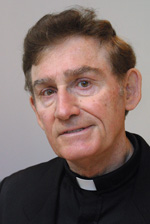Should we turn our heads away, call the police or shut it down?
These questions were posed in an article about Maryland Attorney General Douglas F. Gansler, who was photographed in a house full of young people attending a wild drinking party.
Undoubtedly, excessive drinking is one of the greatest problems of our postmodern age, especially among young people who engage in binge parties and sometimes end up ruined for life.
Recently, I attended a lecture titled “New Evidence on Moderate Drinking and Pregnancy” by Dr. Carole W. Brown, a fellow at the Institute for Policy Research & Catholic Studies at The Catholic University of America in Washington. The lecture was an eye-opener in regard to the use of alcohol.
Brown placed six bottles of beer on the table. And then she asked the audience, “What would be considered moderate to excessive to binge beer drinking?”
To my surprise, it took fewer bottles to define binge drinking than I had imagined. More surprising was learning about the effects alcohol has on pregnancy and possibly causing a miscarriage, or harming a child cognitively and behaviorally.
It brought to mind the issues of drinking and misusing drugs and what was going on in the Gansler case.
Even though we have more information available to us than ever before, many people, unfortunately, don’t have a realistic idea of the effects of alcohol and other drugs.
Even though horrific news stories tell of the damage they can cause, it is so easy to become nonchalant about their effects or to dismiss them. How do we increase sensitivity and awareness about their danger? It is primarily through increased education and research.
Cardinal John Henry Newman wrote that an idea is an illumination. It is like a light bulb going on in our minds, and we see things in a new light, suddenly giving way to that “aha” moment some of us have experienced.
This experience happened to me while listening to Brown. Her lecture prompted me to ask myself: When is it too young to learn about the effects of alcohol and drugs on our well-being? Should our parish adult education programs make this a high priority? As students enter college, should there be an orientation day specifically focused on drinking and drugs? Throughout the year, should it be repeated and then evaluated to learn of its effectiveness?
The more ideas we can explore to solve problems, the more the probability we have of diminishing them, in this case, getting rid of conditions that produce the damaging effects of alcohol and drugs on us.




Share this story